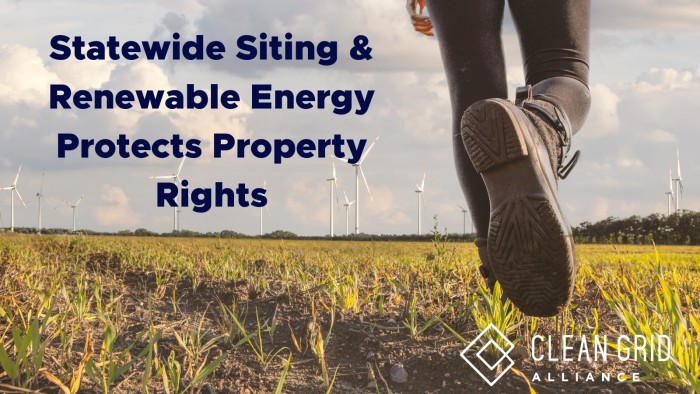Statewide Siting Enhances Clean Energy Development, Protects Property Rights
 | Molly Vagle, Communications Associate - Siting |

 | Molly Vagle, Communications Associate - Siting |
Despite what some would want you believe, Michigan's new statewide siting law (HB 5120-5121) does more than help the state achieve its clean energy goals, increase the production of clean, affordable reliable energy, create new jobs, and ensure benefits flow to local communities. It also protects private property rights by streamlining and improving the siting and permitting of wind, solar, and energy storage projects to create a "common sense" process that balances local government and community involvement and capitalizes on the expertise of the Michigan Public Service Commission (MPSC) for making decisions regarding large utility-scale projects. This will enable developers and landowners to work together to reach the best possible outcome without getting bogged down in overly restrictive regulations.
Statewide siting will improve the process of siting renewables by utilizing experts at the MPSC for large utility-scale projects (greater than 50 megawatts (MW) in capacity for solar, and 100 MW for wind). Smaller projects would remain in the purview of local officials, representing a hybrid approach that balances local control of smaller projects with the statewide need for large energy generation projects. Additional features of the bill ensure that communities receive benefits from projects, construction workers will be paid prevailing wages, environmental protections will be upheld, and local input will be heard.
“The bill includes a pathway for developers and communities to work together first, without going to the Commission for the permitting process, ensures that benefits from projects flow to local communities, and protects landowners who see clean energy as a means to keep their farms in the family for generations to come.
Peder Mewis, Regional Policy Director
Clean Grid Alliance
The Issues Before the Legislation
Before this landmark legislation was passed, permitting renewable energy projects in Michigan was difficult. Unlike most other states, permitting was conducted at the township level, meaning each individual township across Michigan could create their own standards and ordinances for renewable energy projects. This makes it extremely difficult to get permits to build utility-scale projects in Michigan because many projects span over multiple townships. The new legislation will help standardize and speed up the process, which will help Michigan reach its goals and bring clean, affordable, reliable low-cost energy to Michigan communities.
Opposition groups, including individuals who travel across the state just to oppose renewable energy projects in communities they have never been in, add to the struggles of permitting across multiple townships.
The anti-renewable energy groups, whether outsiders or not, take away the property rights of farmers and landowners by persuading local elected officials to establish unworkable ordinances that effectively ban renewable energy development in the area. Elected officials who succumb to this pressure ultimately establish a ban on property rights rather than upholding the core American value of liberty by allowing farmers and landowners to harvest renewables on their own property.
Farmers Want Statewide Siting Legislation
The untold truth is that this legislation is about protecting landowner property rights. It allows farmers to keep their farmland for generations to come while diversifying their income with drought-proof land lease payments if they choose to lease their land for temporary renewable energy development.
Subscribe to our newsletter for the latest on energy & our work
"The State should come in and set out the standard ordinance for the whole state, saying this is what we're going to have, instead of leaving it with us [townships] ... it would have been easier and better," said Phyllis Larson, farmer from Winfield Township, Michigan in an interview prior to the statewide siting law.
"I think the state needs to come in and take the monkey off our backs locally because it's torn families and communities apart. It's a bigger issue than what people at our [township] level can handle ... the townships don't have the resources to educate themselves or to hire engineers to look into the logistics [of siting renewable energy projects]. The state's got the funding for that ... we need help, and we need help fast," said Jack Jeppesen, former Chair, Planning Commissioner in Montcalm County, Michigan on why statewide siting is necessary.
The decision to harvest energy from the sun and wind belongs with the landowner. No government agency, local or state, should be allowed to infringe on a person's ability to make an income through legal means.
“What we do with our land, as long as it's within the law and as long as it doesn't harm anyone, is our business.
Jed Welder, farmer
Sidney Township, Michigan
Many farmers across Michigan, and the country, want renewable energy projects on their land to diversify their income. Leasing land provides an extra source of income that helps combat rising taxes, the cost of seed, and other inputs farmers must purchase to continue their farming operations. It can help farmers invest in their farms, too, such as purchasing equipment, building or improving out-buildings; or even take a vacation or invest in a child's education. Who has the right to infringe on that? The beauty of renewable energy projects is that it ensures rural America can stay rural, yet open for economic prosperity.
To meet Michigan's renewable energy goal of a 100% carbon-free energy standard by 2040, Michigan needs to install more utility-scale wind, solar, and battery storage projects. To do so, the permitting process needed to be updated and streamlined, something that the legislation will fix. According to ACP, as of March 2024, 8.2% of all electricity produced in Michigan came from wind, solar, and energy storage plants, showing there's a lot of work to be done. However, Michigan has already seen $8 billion in capital investments from wind, solar, and energy storage projects, along with $62 million annually from the property, state, and local taxes renewable energy projects pay, and $47.6 million annually in land lease payments to farmers and landowners who host projects. Additionally, the clean energy industry already employs over 11,400 Michiganders with good family-supporting jobs. Rural communities that host renewable energy projects reap economic prosperity through jobs, taxes, and other payments.
Farmers are the Best Stewards of Their Land
Some landowners feel slighted by the opposition groups, outsiders, and newcomers who feel entitled to the farming aesthetic and do not want to look at wind turbines or solar panels. This conveys an attitude of entitlement instead of an appreciation for the rights of those who need to make a living from their land.
According to Jed Welder, a farmer from Sidney Township, Michigan, the wealthier residents of Montcalm County, Michigan are predominantly retired, they've made their money, and they don't want to see anything else come in.
“They took away farmer's developmental rights away by not allowing these things [wind farms] here with a restrictive ordinance,
Terry Anderson, farmer
Douglass Township, Michigan, on opposition groups persuading local officials to effectively ban renewables.
The big question that remains is: who is best to make the decisions about the land you own? The answer is obvious. Farmers are the best stewards of their land because the farm may have been in their families for generations; or because they support their family from the land and expect it to produce. If a farmer decides that it is best to lease a portion of their land to non-permanent renewable energy development because it would allow them to keep the farm in the family, who has the right to tell them, "No"?
The bottom line is that farmers need to make a living. In fact, on average, off-farm income contributed 96 percent of total income for all family farms in 2019. Without a diverse source of income, they may be forced to make decisions that could jeopardize the rural character of a community forever if they sell all or part of their farm for a housing development or a strip mall.
So, the path forward is clear. If you're truly interested in keeping rural America rural, you must support your local farmer's right to lease their land for renewable energy development.
Property decisions belong in the hands of landowners. Standardizing the permitting process for renewable energy development puts the power back in the hands of landowners and prevents petty politics at the local level from jeopardizing the ability of farmers to make a living off their land, while keeping rural places rural.